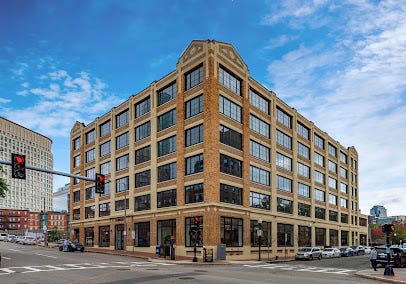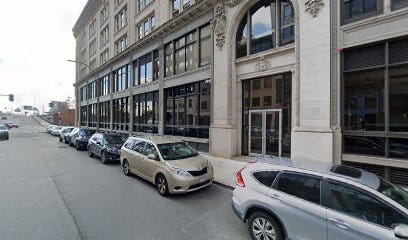Campus police incompetence turns deadly | Independent reporters keep Cape pols honest | Wu administration in denial over office market collapse | Another day, another $1.5 billion in state ed money circling the drain | Presidential election odds? A true coin flip |
News tips? Story ideas? Email us at sbvanvoorhis@hotmail.com
In denial: With downtown Boston reeling from remote work, the Wu administration prepares to send big tax bills to half-empty office buildings
Boston’s top office towers lost a combined $450 million in value, the Boston Business Journal reported earlier this week, noting it was not as “significant” as earlier forecasts.
It was a good scoop. Yet the hit to Boston office building values amid the shift to remote work is likely far greater than what the numbers in city records currently suggest, a review by Contrarian Boston finds.
Boston’s assessing department appears to have obscured the full extent of the decline through its aggressive pushback against requests for tax abatements from owners of struggling older office buildings, often half or even mostly empty, critics contend.
The assessing department’s efforts, in turn, come against the backdrop of a larger effort by Boston Mayor Michelle Wu, who is up for reelection next year, to downplay the severity of the collapse of the office market on city finances.
Boston faces a looming, $1.5 billion revenue gap over the next few years, the Boston Policy Institute has estimated.
And paying the price for this exercise in political damage control have been the owners of Boston’s older office addresses, some of whom have just received quite the surprise on their estimated tax bills for the coming year.
These so-called Class B buildings have borne the brunt of the exodus of office workers from downtown Boston, with the market value of their properties at times just a fraction of what they were once worth.
Yet in several cases, city officials have assessed the value of these hard-hit buildings at the exact same amount - with the exact same tax bill - as the year before.
Just take 95 Berkeley Street. Just 12 percent of the 107,000-square-foot office building is leased. The Los Angeles-based owner is looking to convert the building to residential under a city program, and has put it up for sale.
Even so, city assessors have pegged the value of the 1899 building at $22.5 million - the same as last year, and more than $3 million more than what it was worth in 2019, before the pandemic and the rise of remote work.
Another example: 123 North Washington Street, an old and tired office building near North Station that is just 28 percent leased and is being sold, with the new owner planning a residential conversion, Banker & Tradesman reports.
One thing that hasn’t changed is the building’s assessed value, pegged at $8.6 million.
Then there’s 179 Lincoln Street, recently sold for just $10 to Synergy Investments, who assumed the building’s $76.5 million mortgage, Universal Hub reported back in March. That, however, is far below the $155 million that Blackstone had paid for the building in 2020.
But the city has assessed its value at $86.3 million, the same as last year, records show.
One possible common denominator is that the owners of the above-mentioned buildings have filed abatement requests challenging the prior year’s assessment.
That should have no impact on the assessment for the current year. However, in the view of one expert on tax assessments, it has the look of a negotiating ploy - or even the exertion of leverage - by city assessors against the owners of struggling office buildings.
“It’s startling,” the tax assessment expert noted, adding the values “are way out of line.”
In fact, if Boston’s assessing department was to persist and forge ahead with these estimated values, they would likely open the city to a lawsuit.
These odd assessments are not an isolated incident. City assessing officials raised eyebrows earlier this year when they rejected hundreds of abatement requests by downtown office building owners.
In the end, they only a granted a handful of those requests, with just one from a for-profit office tower owner, according to the BBJ.
It’s pretty clear the Wu administration is doing all it can to deny abatement requests and to take a hard line on assessed values, which have the benefit of reducing any decline in city revenue.
But at some point, market reality and the legal system will catch up - possibly as it did back in the late 1970s, when a much poorer Boston was struggling with a host of problems, including a big drop in the value of older office buildings and other commercial properties.
Then-Mayor Kevin White’s administration took a hard line, ignoring the protests of building owners and insisting on effectively over-assessing their value to keep the tax money rolling in.
Eventually, a fed-up office building owner named Norman Tregor took the city to court and forced Boston to cough up millions to compensate for the city’s policy of over taxing their properties.
In order to pay the Tregor judgement and deal with the fallout from the then newly passed Proposition 2 1/2, Boston had to borrow $80 million - the equivalent of nearly $320 million today.
“The B buildings are in far worse shape - it reminds me of the 1970s,” Larry DiCara, a former president of the Boston City Council and one of the city’s top legal eagles, told Contrarian Boston. “Inevitably, just like Mr. Tregor almost 50 years ago, they will seek relief.”
Scoundrel alert: Filling void left by the collapse of local newspapers, independent Cape Cod journalists raise the alarm about a candidate with a troubled past
To read what’s left of The Cape Cod Times, the ailing chain-owned newspaper, you’d think Ron Beaty was a little on the Trumpy side, but, for the most part, just another run-of-the-mill Republican activist.
If only that were the case.
Keep reading with a 7-day free trial
Subscribe to Contrarian Boston to keep reading this post and get 7 days of free access to the full post archives.







